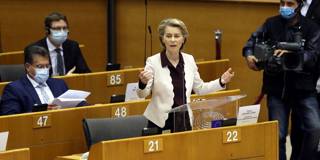In typical fashion, the European Union has once again taken a step toward deeper integration in response to a catastrophic crisis. And, once again, "ever-closer union" is being embraced in the absence of effective mechanisms to enforce fundamental principles, setting the stage for more internal disputes to come.
PRINCETON – The European Council’s five-day meeting to hash out a 2021-2027 budget and a COVID-19 emergency spending package had all the hallmarks of Euro-summitry: long nighttime discussions; threats by some leaders to leave without an agreement; and a Franco-German push for a deal. Naturally, it all concluded with an unsatisfactory compromise.
Specifically, European leaders agreed to allocate only €390 billion ($457 billion) of the €750 billion emergency package in the form of grants, and the remaining €360 billion as loans, because the “frugal four” (Austria, Denmark, the Netherlands, and Sweden) insisted that the number had to begin with a three. Is this arrangement any better than the last unsatisfactory compromise in Europe’s slow march toward deeper integration?
For 70 years, Europe’s mantra has been that it grows in response to crises. The initial impetus for integration in the 1950s was fueled by the Cold War. The monetary integration of the early 1990s came amid the geopolitical watershed caused by the end of that long conflict. More recently, many hoped that the combined disruptions of immigration, climate change, Russian revanchism, the election of US President Donald Trump, and Brexit would generate fresh momentum for a European project that seemed to be running out of steam.

PRINCETON – The European Council’s five-day meeting to hash out a 2021-2027 budget and a COVID-19 emergency spending package had all the hallmarks of Euro-summitry: long nighttime discussions; threats by some leaders to leave without an agreement; and a Franco-German push for a deal. Naturally, it all concluded with an unsatisfactory compromise.
Specifically, European leaders agreed to allocate only €390 billion ($457 billion) of the €750 billion emergency package in the form of grants, and the remaining €360 billion as loans, because the “frugal four” (Austria, Denmark, the Netherlands, and Sweden) insisted that the number had to begin with a three. Is this arrangement any better than the last unsatisfactory compromise in Europe’s slow march toward deeper integration?
For 70 years, Europe’s mantra has been that it grows in response to crises. The initial impetus for integration in the 1950s was fueled by the Cold War. The monetary integration of the early 1990s came amid the geopolitical watershed caused by the end of that long conflict. More recently, many hoped that the combined disruptions of immigration, climate change, Russian revanchism, the election of US President Donald Trump, and Brexit would generate fresh momentum for a European project that seemed to be running out of steam.